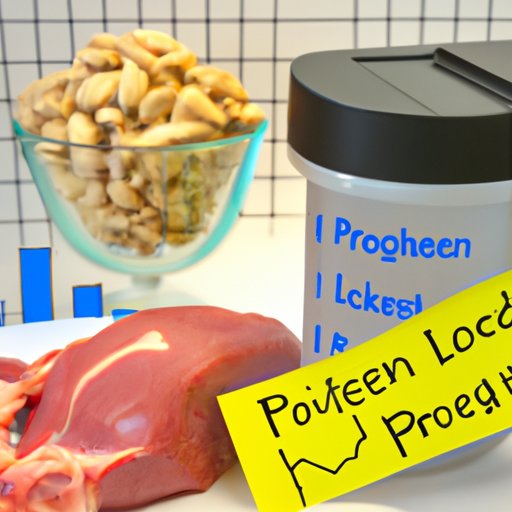Introduction
Protein is an essential part of any healthy diet. It’s a macronutrient that helps to build and maintain muscle, as well as providing energy and helping to regulate hormones. However, too much protein can have negative effects on your health. In this article, we’ll explore the effects of excess protein in the diet, looking at the pros and cons of a high-protein diet, as well as understanding the different types of protein available and their impact on human health.

Analyzing the Impact of Too Much Protein in the Diet
Eating too much protein can have both positive and negative effects on your health. On the one hand, it can provide you with additional energy and help to build and maintain muscle mass. On the other hand, it can lead to dehydration, weight gain and kidney damage. Let’s take a closer look at the pros and cons of a high-protein diet.
Pros and Cons of a High-Protein Diet
A high-protein diet has been linked to several positive health benefits, including increased energy and improved muscle strength. It can also help to regulate blood sugar levels and reduce hunger cravings. However, consuming too much protein can lead to dehydration, weight gain and kidney damage. Additionally, high-protein diets can be difficult to maintain in the long term, as they require a large amount of planning and preparation.
Nutritional Benefits of Protein Consumption
Protein is an important part of any diet, as it helps to build and maintain muscle mass, provides energy and helps to regulate hormones. Additionally, eating protein can help to keep you feeling fuller for longer, reducing hunger cravings and aiding in weight loss. Protein is also important for maintaining healthy bones, skin, hair and nails.
Potential Health Risks of Excessive Protein Intake
Although protein is an important part of any healthy diet, consuming too much of it can have negative effects on your health. Eating too much protein can lead to dehydration, as the body needs water to break down and digest proteins. Additionally, too much protein can cause weight gain, as the body stores extra calories from protein as fat. Finally, excessive protein intake can put strain on the kidneys, leading to kidney damage.

Exploring Different Types of Protein
There are many different types of protein available, and each type can have different effects on your health. Animal proteins (such as meat, fish, eggs and dairy) are generally considered to be more complete proteins than plant proteins (such as legumes, nuts and seeds). Animal proteins contain all nine essential amino acids, while plant proteins may be lacking in some essential amino acids.
How Different Types of Protein Affects Human Health
Different types of protein can have different effects on your health. Animal proteins are generally considered to be more complete proteins than plant proteins, as they contain all nine essential amino acids. Animal proteins are also higher in certain vitamins and minerals, such as iron and B vitamins. Plant proteins, on the other hand, are often lower in calories and fat, and are a good source of dietary fiber.
Comparing the Effects of Animal and Plant Proteins on Health
Animal proteins are generally more nutritionally dense than plant proteins, as they contain all nine essential amino acids. However, animal proteins can also be high in saturated fat and cholesterol, which can increase the risk of heart disease. Plant proteins, on the other hand, are generally lower in calories and fat, and are a good source of dietary fiber. Ultimately, both animal and plant proteins have their own unique health benefits, so it’s important to incorporate both into your diet.
Understanding the Role of Protein in Weight Loss Diets
Protein plays an important role in any weight loss diet. Eating protein can help to keep you feeling fuller for longer, reducing hunger cravings and aiding in weight loss. Additionally, protein helps to build and maintain muscle, which can help to boost metabolism and burn more calories.
Relationship between Protein and Weight Loss
Eating protein can help to boost metabolism and burn more calories, as it helps to build and maintain muscle. Additionally, protein can help to keep you feeling fuller for longer, reducing hunger cravings and aiding in weight loss. However, it’s important to remember that eating too much protein can also lead to weight gain, as the body stores extra calories from protein as fat.
Benefits of Eating Protein for Weight Loss
Eating protein can have several benefits when it comes to weight loss. Protein can help to keep you feeling fuller for longer, reducing hunger cravings and aiding in weight loss. Additionally, protein helps to build and maintain muscle, which can help to boost metabolism and burn more calories. Finally, protein can help to regulate blood sugar levels, which can also aid in weight loss.
Conclusion
In conclusion, eating too much protein can have both positive and negative effects on your health. Eating protein can provide you with additional energy and help to build and maintain muscle mass, but it can also lead to dehydration, weight gain and kidney damage. Different types of proteins can have different effects on health, and it’s important to incorporate both animal and plant proteins into your diet. Additionally, protein plays an important role in any weight loss diet, as it helps to keep you feeling fuller for longer, reducing hunger cravings and aiding in weight loss. To ensure safe protein consumption, it’s important to stick to recommended daily intake amounts and eat a balanced diet.
(Note: Is this article not meeting your expectations? Do you have knowledge or insights to share? Unlock new opportunities and expand your reach by joining our authors team. Click Registration to join us and share your expertise with our readers.)
